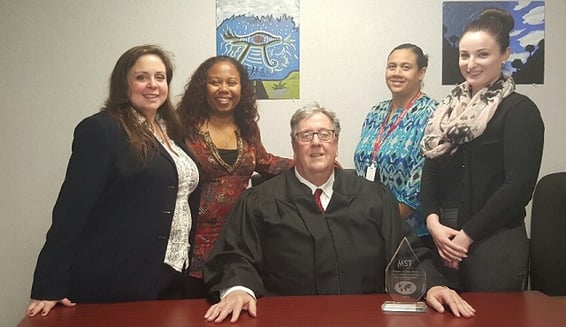How one judge is making a difference in the lives of the youth and community he serves
In 1899, the first-ever juvenile court was established in Cook County, Illinois. Within 25 years, almost all states had a juvenile-court system setup. Their primary goal was to rehabilitate, not punish, young people who committed delinquent acts. Thus, from its very inception, the juvenile-justice system was intended for prevention and rehabilitation.
There are a few key differences between the juvenile-court and the adult criminal-court system. Of major significance, juveniles are not entitled to a trial by jury. 
Magistrate Charles Levesque, center
So, how do juvenile-court proceedings work? The process differs by state, but the general course is this: A juvenile commits a delinquent act (note: not a crime, because juveniles are considered too young to be responsible). If charges are filed, they are scheduled for a hearing. If the juvenile goes to trial, because there is no jury, the judge has sole discretion in deciding the fate of the child. He or she has many options available for sentencing, ranging from a warning to fines to community service, probation, placement in various types of settings, detention...the list goes on. This is why juvenile-court judges hold a tremendous amount of power over young people in trouble with the law.
Rhode Island judge wins MST Community Champion Whatever It Takes Award
Judges are in a pivotal role as advocates for the youth who appear in their courtroom. When judges embrace their role as advocates and use their discretion and power to support and link youth with evidence-based services versus incarcerate and blame them, they make a long-lasting, positive impact on vulnerable children. It is for these same reasons that the Honerable Judge Charles Levesque of the Rhode Island Family Court was honored with the annual MST Community Champion Whatever It Takes Award earlier this year.
As a juvenile-court judge, Magistrate Levesque often hears truancy trials. One particular case stands out.
The young man before him this time struggled with a number of issues including learning disabilities, and he was having extreme difficulties at school. In fact, he was having extreme difficulties dealing with practically everything, but truancy was what ultimately brought him to court.
At the proceeding with the teenager and his mother, Levesque took the time to hear all sides—the school, the family and most importantly, the boy himself. The magistrate pointed out the youth’s mother’s efforts to support her special-needs child. She was up against a lot—and despite her best attempts to form a positive home-school link, she was coming up dry.
Levesque advocated for her, her son and their situation. Due to his efforts, the school became more responsive to the mom and son’s difficulties. This understanding made it easier to deal with the boy’s needs. Mom, who before felt like she was constantly at odds with his school, has since formed a positive home-school link. The therapist for this family, who nominated Levesque, said this:
“Seeing his impact on how the teachers and other stakeholders responded to him and this situation made my day...Even better than that was witnessing the family respond upon hearing what the judge said...The mother felt such a wave of relief for the support [of] the judge that she teared up. Learning of the judge’s empathy for her situation and his willingness to support her endeavors was something she was fearful of never having acknowledged. Seeing someone advocate fairly, justly and with conviction was a refreshing moment in what could have been a very different outcome on any other day with any other judge.”
We at MST are thankful every day for the compassion and caring of judges like Magistrate Levesque. It is this advocacy that will have lasting positive impact on children, families and their communities.


